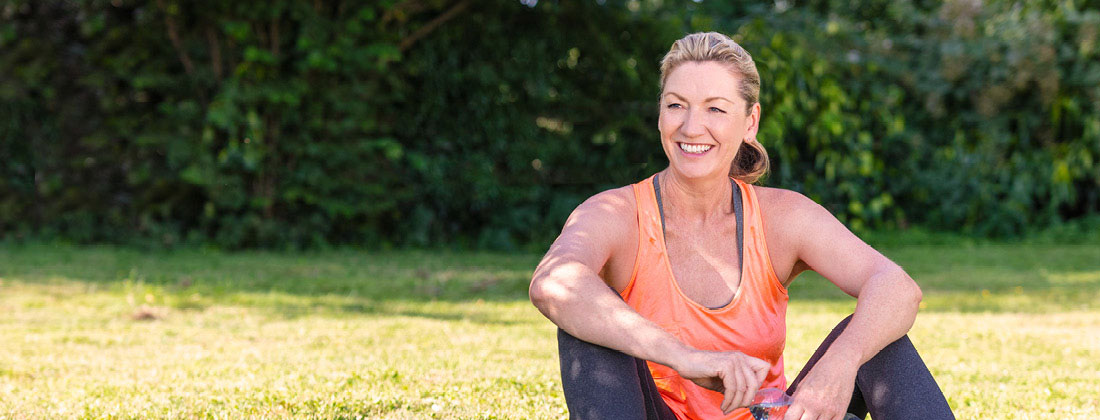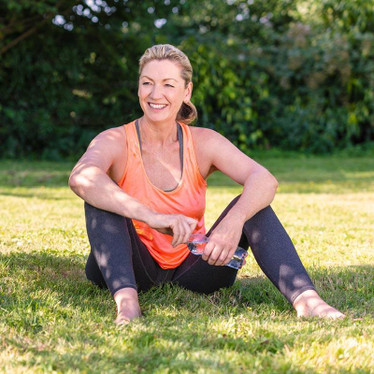
What can I expect in menopause?
Ask the question “what do you know about menopause?” and most people would probably come back with something about overheating or “tropical moments”. This seems to be the most known experience about this natural phase in a woman’s life. However, the complex number of changes can come as quite a shock to women when they occur.
Everyone’s journey through menopause is different. Some women experience a happy end to their menstrual cycle; no more sanitary products to purchase! Others may experience a myriad of changes in their body and will need support with mental, emotional, and physical adjustments as they reach the end of their fertile years.
And while menopause is rarely talked about, we’re here to end that cycle, so women can experience this next stage of life with a little more comfort and ease.
When does menopause start?
If you haven’t experienced menopause, you might be wondering when all these changes are likely to occur. The onset of menopause is generally from around mid 40’s to early 50’s, but changes to your cycle can start in the mid-30's. Hormone levels start to fluctuate, which often manifests as changes in menstrual cycle regularity or flow either getting lighter or heavier. This phase is called perimenopause, as it is the gradual lead up to menopause. One of the best herbs, for women looking to smooth out these changes, is chaste tree ( Vitex agnus-castus). It supports balanced hormone levels for a smooth transition through to menopause. The brassica family are also important for supporting the liver for healthy oestrogen clearance. Try to increase vegetables like broccoli, cauliflower, brussels sprouts, cabbage, and kale.
It is deemed that you have reached menopause after periods have not occurred for more than one year. After menopause, hormone levels naturally adjust down to a lower level, which is maintained by our adrenal glands for the rest of our lives. Our hormones are responsible for many other actions in the body, other than reproductive function. You might not realise until the levels naturally adjust and some changes are noticed. Many subtle changes take place, but here are some of the commonly experienced ones, as well as some suggestions to support them naturally.
4 common changes during menopause and tips to support your wellbeing
Trouble sleeping
Many women who were previously good sleepers, may start to experience difficulties in getting to sleep and waking in the night as one of the first noticeable symptoms from early 40s. This is due to hormonal changes, but also from adrenal gland imbalance, as they take over hormone production. Generally, the adrenals help manage our stress levels, but for many women with busy lives they can already be working at capacity and giving them an extra job can be the last straw. This can lead to temperature fluctuations and waking in the night, becoming fully alert and struggling to get back to sleep.
Tips to support healthy sleep:
- When you start to feel tired in the evening, go to bed before you start your next wake cycle. Go to bed early and relax with a book, so you are not panicking about it being late and not being able to get to sleep.
- Relaxing sleep herbs can be very helpful at this time. Passionflower, lemon balm and chamomile all support dropping off. Zizyphus is a great herb as it supports temperature balance and relaxes the nervous system to support staying asleep.
- Magnesium is often used more by the body during times of stress and is important for physical relaxation. It is also used to make our sleep hormones and is important for supporting deep continuous sleep.
|
Lowered resilience to stress and feeling worried
Putting the adrenals under extra load can lead to other issues. The adrenals help us with our fight or flight response, but under long term stress they produce cortisol, a chemical that helps protect the body. Unfortunately, when cortisol levels get out of balance it can trigger overheating and our ability to deal with day-to-day stressors is impacted. Also, many women find that their hormonal levels begin to fluctuate. Progesterone can lower, and the ratio with oestrogen is thrown off balance. Many will start to experience feelings of worry about things that were normally not an issue. This is because progesterone helps to keep us feeling calm and relaxed. Supporting healthy progesterone levels with Vitex is one way to provide support for these fluctuating symptoms.
Tips for soothing stress and worry:
- Vitamin C is needed for the good functioning of our adrenal glands, as well as our immune health. Keep up your levels of vitamin C by eating plenty of fresh fruit and vegetables. One kiwifruit contains approximately 100mg of vitamin C, so if you eat 2 per day, you’re getting really good amounts needed for general health and wellness.
- Chaste tree can be very supportive for the balance of our key hormones, oestrogen and progesterone, supporting stable mood
- Try to cut back on coffee and other caffeine containing drinks. These are stimulants and help increase cortisol, which leads you to overheat and feel anxious. Instead, introduce nourishing beverages like herbal tea, mushroom drinks, or warming cacao.
- Adaptogen herbs work with the nervous system to support our fight or flight response. They are invaluable at this time. Rhodiola, withania (Ashwagandha), shatavari and schisandra are good choices for women experiencing perimenopause through to post-menopause symptoms.
|
Changes in breast and urogenital tissue
Oestrogen is stored in areas of the body, such as fat tissue, breasts and vaginal tissues. As oestrogen balance changes, women may notice a change in breast shape. The vaginal area can change due to oestrogen levels reducing, affecting the plumpness and elasticity of the tissues and normal vaginal moisture levels. During the menopausal process, women will notice that tissues start to shrink and moisture levels decline. This can lead to discomfort during intimacy and some women find they are more prone to flora imbalances. The bladder also experiences tissue changes, which can affect tone and lead to susceptibility to immune challenges with flora imbalances.
Tips for supporting breast and urogenital changes:
- Many plants have what are called phytoestrogens, which are similar to our own oestrogens. These can help support oestrogen balance at times of changes. Examples of phytoestrogen rich foods include soy (tempeh, soybeans, tofu, miso), flaxseed, sesame seeds, wheat, berries, oats, barley, dried beans, lentils, rice, alfalfa, mung beans, apples, carrots, wheat germ, rice bran and turmeric. There are also herbs like Red clover and Black Cohosh are also rich in phytoestrogens.
- Sea buckthorn has been used in traditional healthcare to support skin health and is rich in essential fatty acids. It supports tissue moisture and normal healthy function, so can support a comfortable sexual experience. Lubricants can be used, but should be unperfumed to avoid irritation.
Avoid using soaps in the vaginal area as they can be drying and irritating. Body washes are a better option as they are generally pH balanced.
- The herb Angelica can be supportive for normal bladder tone and urinary frequency
- Lubricants can be used, but should be unperfumed to avoid irritation
| For healthy flora support try Clinician’s Flora Restore → | For healthy bladder function try Clinicians Bladder Confidence → |
Libido changes
Intimacy is an important part of our wellbeing, and although our reproductive years have come to an end, and our sex hormones decline during menopause, a healthy sex drive and sex life is a healthy goal to have. While nature intended libido for us to procreate, there’s plenty we can do to support a healthy libido.
One of the best ways we can look after our libido is through supporting hormonal changes, and managing stress levels around this period of change.
Throughout the stages of menopause, there are changes to the tone and tissue of the vaginal tissue, becoming thinner and more easily irritated, with less lubrication. Women’s Intimacy Support is formulated with unique herbs to support healthy libido and vaginal comfort for pleasurable sexual intimacy.
Tips for supporting healthy libido:
- Magnesium supports the production of sex hormones and is also helpful when it comes to relaxation. Good sources in your diet include nuts, green leafy vegetables, whole grains, seeds, bananas, and meat.
- Zinc is essential for the production of testosterone. Good sources include fish, seafood, pumpkin seeds, nuts, and chickpeas.
- Shatavari is an Ayurvedic herb, used traditionally to support healthy libido. It is known as “the women who has a hundred husbands” thanks to its tonic effects on the female reproductive system. There are also herbs like Tribulus, which is known to support healthy testosterone levels and Damiana. This is particularly useful as testosterone levels decline during our mid-years.
|
Bonus tips for a gentler transition through menopause:
- Increase fresh fruit and vegetables for nutrients and fibre that helps with bowel health and healthy blood sugar levels
- Manage weight gain round your middle as this is where metabolic fat is stored, which can affect overall liver and heart health. Cut back on the number of carbohydrates, especially sugar as our metabolic rate changes at this time so eating smaller portions might be necessary to maintain a healthy body weight
- Chromium can be helpful at this time for blood sugar balance. For a healthy heart, reduce saturated fats such as dairy products, fried foods, baked goods, and red meat. Alcohol has been shown to heighten menopause symptoms, so moderation is key.
- Smoking can affect bone density, which is an increased risk after menopause. Smoking is also shown to heighten menopausal symptoms.
- Cut back on caffeine for less hot moments and better sleep.
Looking for additional support during Menopause? Explore our range of menopause support.
Always read the label. Use only as directed. If symptoms persist consult your healthcare professional.
Clinicians (Douglas), Auckland
TAPS PP8623




